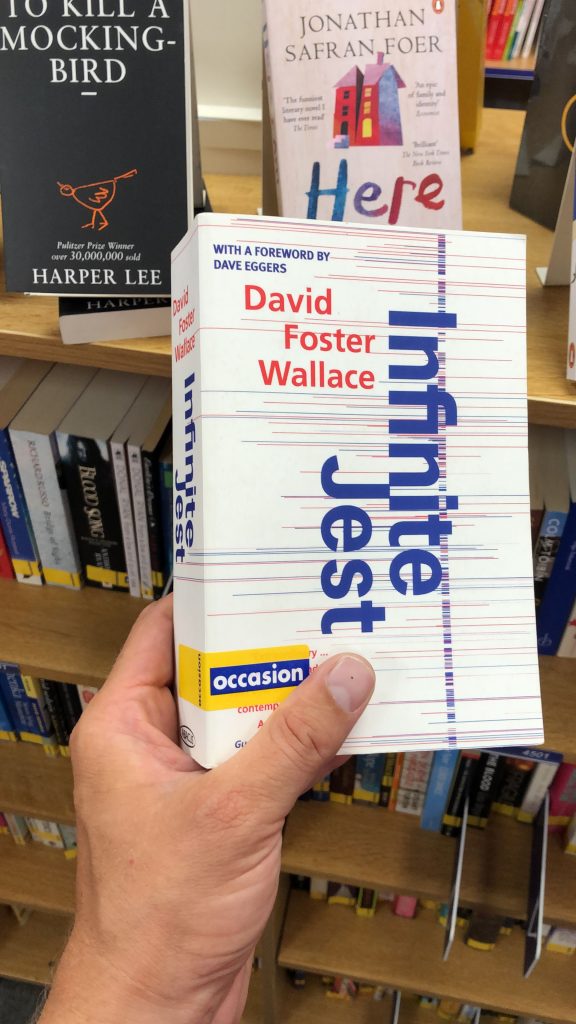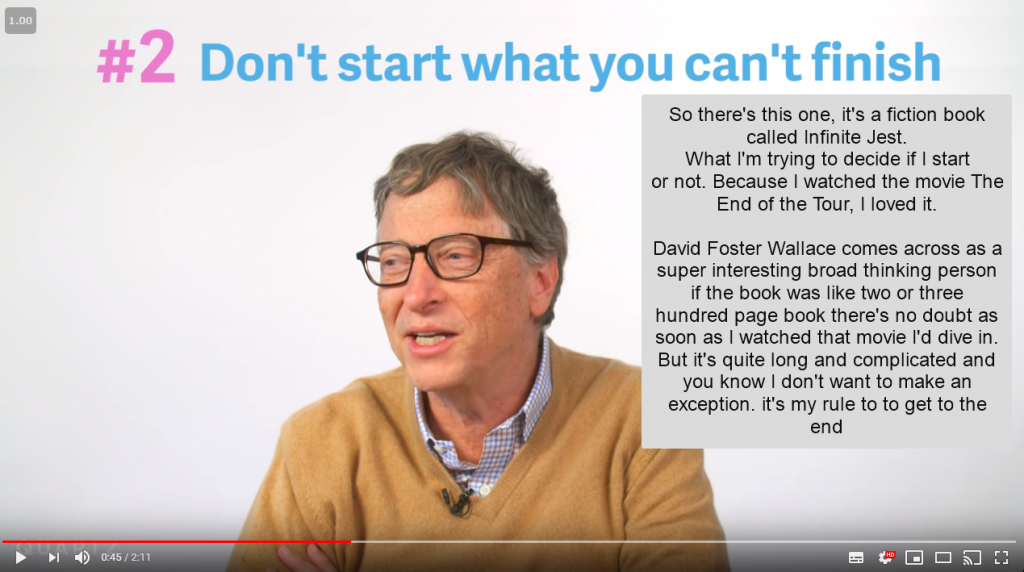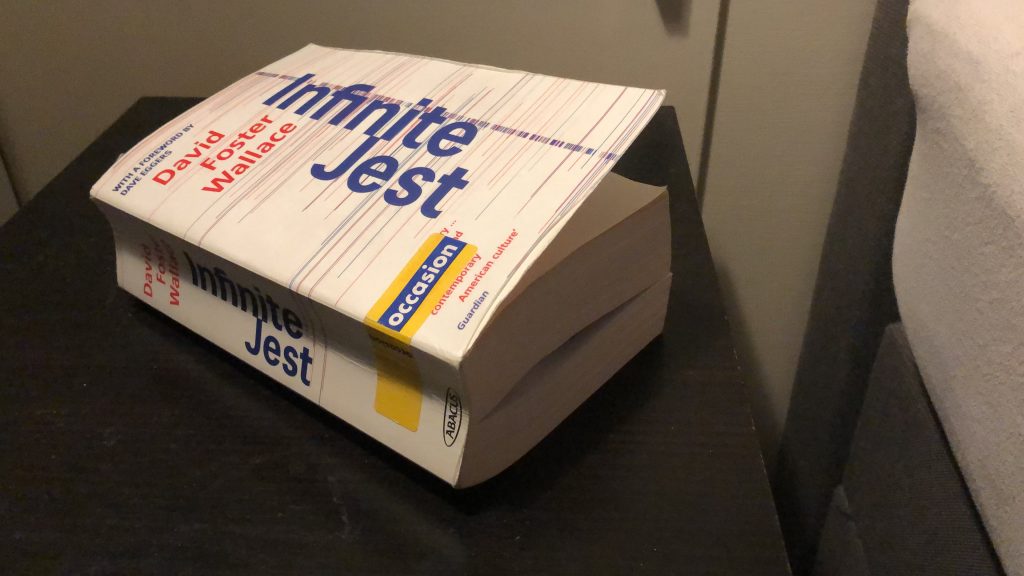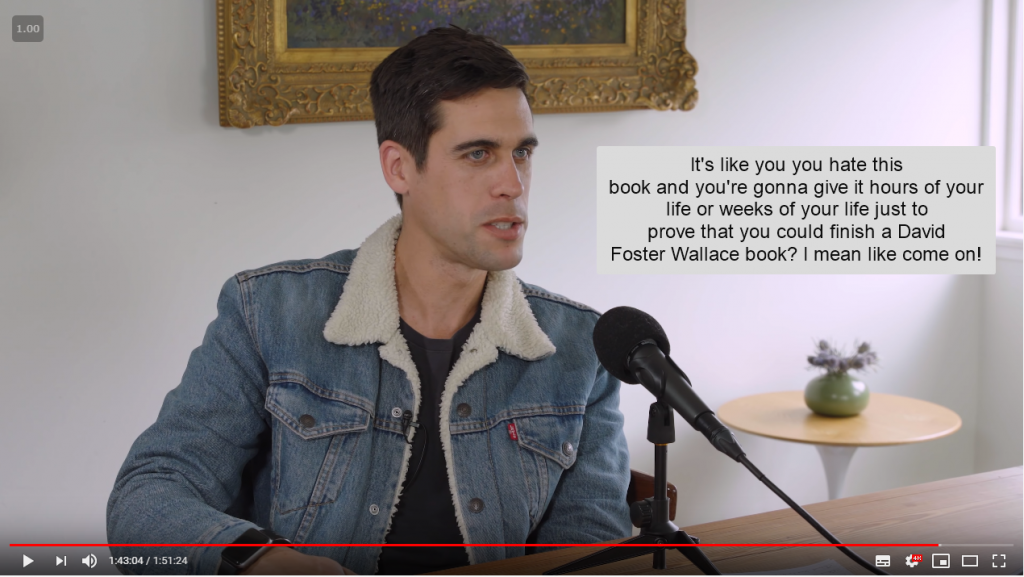Today is February 21st, David Foster Wallace‘s birthday. So it’s rather fitting that today I finished reading his magnum opus: Infinite Jest. The notoriously long and difficult book from 1996 with visionary insights on modern life. Infinite Jest is one of the biggest books ever written, and it certainly is the biggest book I have ever read.
It took me somewhere between 50 and 60 hours over the course of four months and I — had to — read several other books in between to cool off. So, it was quite the experience. I will try to write some of those personal experiences and observations down here. This post will not discuss or try to dissect the work and themes itself. Many, many, many books and articles have already tried to do that.
No footnotes, I promise.
Why did I read it?
I knew about Wallace and his challenging writing style, and he always looked intimidating. But last year I picked up ‘A Supposedly Fun Thing I’ll Never Do Again’ and it was one of the greatest and funniest things I have ever read (specifically the title essay). And while I was reading that book I tracked down a copy of Infinite Jest. I clearly remember my hesitation. It looked terrifyingly dense. Over 1100 pages in the smallest possible font and hardly any line breaks. And this was just the typesetting, let alone the content! But I bought it anyway, with no real plan to actually read it, yet… But in October I watched ‘The End of the Tour’ — which I greatly enjoyed — so I just had to know what this was all about.

Did I enjoy it?
Infinite Jest is not your typical enjoyable reader-friendly book. It is also definitely not a funny book. And it certainly wasn’t intended to be. There are multiple horrific scenes of rape, incest, mutilation and drug abuse (and their consequences i.e. faceless babies). Overall it has a very serious tone and message and I don’t think I expected that.
So whether I enjoyed it in the traditional sense is the wrong question, but I am still glad I read it.
Why am I glad?
Infinite Jest is unlike anything else I have ever read.
Not only has Wallace an utterly uniquely distinctive style which is impossible to copy, but above all — this book makes you work! Some books you can read in one sitting, with Infinite Jest I could do 20 pages per hour at most, before I was spent. I could not read this book for hours on end. Because it demands your complete and undivided attention. And this can be exhausting. And at times it felt my life was on hold reading it (would I be able to finish it, where is this going?).
Nothing in the story is left unexplored and Wallace’s vocabulary is unmatched (there are over 20.000 unique words in Infinite Jest, this is only rivaled by the dictionary I would think…). And on top of that, he makes up his own words to fit a specific mood or sentence. This makes the reading experience draining.
However, no word seems wasted. Every word seems vital. It is verbose but still perfectly tight prose.
All these things make it a different, but rewarding, reading experience.
A book book
I was also left with the idea that this experience can only exist on paper (or at most maybe an audiobook). There is no other way to convey the meaning — which just happen to be expressed by words — of this book. You cannot retell the story, you cannot film the scenes, you would lose everything. I know there are also translations, but I worry that a translation wouldn’t provide the same experience.
Wallace demonstrates and justifies with Infinite Jest that writing is an art form of its own and that reading is a different experience from anything else.

All this seems difficult
On top of all this, it is also mostly a non-lineair story, jumping from the ‘Tennis Academy’ to the ‘Recovery House’ and all over the place. The story seems like loosely connected collection of shards. And you could almost crack it open anywhere and have the same experience as when you start on page one. I think this is deliberate: it makes your brain work. You have to make the connections yourself. Just like there are no explainers or introductions anywhere.
But I suspect this also aided Wallace’s writing? I sense these fragments, sometimes only separated by a double space, are different writing days (?) because they sometimes differ heavily in tone, ideas and intensity.
So what’s it all about then?!
There are many, many different themes and many different ideas in this book. Just as there are a couple of general commonalities. One commonality that stood out specifically for me is that every character in this book is flawed. And trust me, there are many characters. Drug addicts, wheelchair assassins, rapists, dealers, handicapped, deformed, talented athletes who threw their life away, you name it: but every character is flawed.
Suffering
This brings me to what I personally derived as one of the main recurring subjects of the book: suffering. Everyone and everything is suffering from something. The human condition, and in particular its flaws, are at the center of what drives the story.
Wallace himself states that one of the main messages of Infinite Jest is that “pleasure is dangerous“. Specifically: too much pleasure. We are flawed human beings with little to no self-control and a need for pleasure. And this causes problems.
Maybe that’s why he makes the reader work so hard in what could have been a self-referential book title. Pleasure should always be balanced out by hard work.

This Wallace guy is quite the character!
Yes, you are nothing short of a genius when you can write like this. And from his collection of essays I had already concluded, he was a chameleon, able to effortlessly jump between different styles. But I have often wondered how deep he had to go as a writer to write Infinite Jest. Because whoever wrote this must have balanced on the brink of madness and peered over (I had the same experience with Virginia Woolf).
But this is also what kept me from enjoying the book to its fullest I think. I don’t mind working hard for a book. But when I read Infinite Jest I was 50% of the time immersed in the story and 50% of the time thinking: how did he do this?! How does his brain work? How can someone write this? It really threw me off.
But either way, in the end, just that may be one of the most rewarding experiences from this book. It’s like you get to spend some time in the mind of a genius, and you may not fully understand the machinery and mechanism but you are certainly in on the outcomes.
Now what?
I heard a great quote: “you might just finish the book and see hints of Infinite Jest in everything that is around you“. I think that is true, this book cannot but leave a mark, and make you see the world through a different lens. And I am glad I am in on it now. And yes, Wallace in 1996 was able to foresee and extrapolate developments with regards to humans and their relation to pleasure (whether this is technology or drugs) that raise questions that are alarmingly relevant today.
At times I thought: when I am finished I am never reading this again! But at other times I thought: this is exceptional I should reread this every so often. (Somewhere in the first few hundreds pages is a story of an addict waiting for a hit. It is quite something). I also made hundreds of yellow marks I want to revisit for various reasons and I want to read more by Wallace. Also there are many Infinite Jest resources I want to read to see what I might have missed (I suspect quite a bit). However, there are also many more books I also want to read of course.

Should *I* read it?
Yes. However, I can’t promise you will enjoy it. And it is an expensive investment of your time (then again, finishing a great video game costs the same amount of time). But the experience of Infinite Jest will be rewarding because it will be unlike anything you have ever read.
Lock the door, turn off your phone and enter the mind of David Foster Wallace.
Leave a Reply